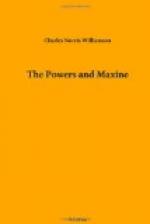in his receiving word from me. What I send can
never go straight to him, as you may guess. Godensky
would guess that, too: and he would have perhaps
informed the police, very cautiously, very unofficially
and confidentially, that he suspected Maxine de Renzie
of being a political spy in the pay of England.
He would have advised that my movements be watched
for the next few days: that English agents of
the French police be warned to watch also, on their
side of the Channel. He would have argued to
himself that if I’d sent any document away, with
Raoul’s connivance or without, I would be wanting
it back as soon as possible; and he would have mentioned
to the police that possibly a messenger would bring
me something—if my correspondence through
the post was found to contain nothing compromising.
Oh, there have been eyes on me, and on every movement
of mine, I’m sure. See how efficient, though
quiet, the methods have been where you’re concerned.
They—the police—knew the name
of the man I was to meet here at this hotel; and if,
as Godensky must have hoped, any document belonging
to the French Government had been found on you or
me, everything would have played into his hands.
Raoul would have been ruined, his heart broken, and
I—but there are no words to express what
I would have suffered, what I may yet have to suffer.
Godensky would be praised for his cleverness, as well
as securing a satisfactory revenge on me for refusing
him. The only thing which rejoices me now is
the thought of his blank disappointment when he gets
the news from the Commissary of Police.”
“You don’t believe then,” I asked,
“that Godensky has had any hand in the disappearance
of the treaty?”
“I would believe it, if it weren’t for
the necklace being put in its place. Even if
Count Godensky could have known of Raoul’s mission
with the diamonds, and got them into his own hands,
he wouldn’t have let them get out again with
every chance of their going back to Raoul, and thus
saving him from his trouble. He’d do nothing
to help, but everything to hinder. There lies
the mystery—in the return of the necklace
instead of the treaty. You have no knowledge
of it, you tell me; yet you come to me with it in
your pocket—the necklace stolen from Raoul
du Laurier, days ago, in Amsterdam or on the way there.”
“You’re certain it’s the same?”
“Certain as that you are you, and I am I. And
I’m not out of my mind yet—though
I soon shall be, unless you somehow save me from this
horror.”
“I’m going to try,” I said.
“Don’t give up hope. I wish, though,
that you hadn’t to act to-night.”
“So do I. But there’s no way out of it.
And I must go now to the theatre, or I shall be late:
my make-up’s a heavy one, and takes a long time.
I can’t afford to have any talk about me and
my affairs to-night, whatever comes afterwards.
Raoul will be in a box, and at the end of the first
act, he’ll be at the door of my dressing-room.
The agony of seeing him, of hearing him praise my
acting, and saying dear, trusting, loving words that
would make me almost too happy, if I hadn’t betrayed
him, ruined his career for ever!”




